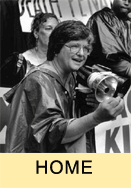
 |
 |
CLINTON
URGED TO GRANT CLEMENCY IN CONTROVERSIAL FEDERAL DEATH PENALTY CASE
Powerful Claims of Innocence and Evidence of Ineffective Assistance
of Counsel Pervade the Case of Ronnie Chandler
Sole Witness Admits He Lied on the Stand; Trial Counsel Failed to Prepare
for Sentencing Hearing in Case Riddled with Doubts
(Atlanta) January 10, 2001- Lawyers for federal death row inmate David
Ronald Chandler, the first person sentenced to death in a federal case
since the reinstatement of the federal death penalty in 1988, today filed
a Petition urging President Clinton to commute his death sentence. Chandler's,
case has been the subject of grave concern because of powerful claims
of innocence and ineffective assistance of counsel.
According to the Petition Chandler's sentence should be commuted because
of substantial doubt as to his guilt for inducing the murder for which
he was sentenced to death sentence and because of the extraordinary failure
of his trial counsel to inform the jury that sentenced him about the "remarkable
redeeming qualities in his character."
The case against Chandler depended upon the testimony of the actual murderer,
a man named Charles Ray Jarrell, who, in exchange for a plea bargain--
which insured that he would not face the death penalty-- testified at
trial that he was paid $500 by Mr. Chandler to commit the murder. Jarrell
has since unequivocally recanted that testimony and has testified under
oath that he was in no way induced by Chandler to commit the crime. He
has changed his story notwithstanding the fact that in doing so his risks
his plea bargain and subjects himself to a possible death penalty prosecution.
Everyone concerned with the case, including the trial judge, concedes
that the prosecution depended on Jarrell's testimony. Furthermore, the
one-vote majority of the full 11th Circuit Court of Appeals that upheld
Chandler's conviction and sentence, concluded, "the evidence of guilt
…was not overwhelming."
According to Chandler's attorney, Jack Martin, "if a jury heard the
case against Mr. Chandler today, they would obviously have a reasonable
doubt as to his guilt"; a sentiment echoed by the foreperson of the
jury when he was informed of Jarrell's change of heart. Furthermore, Jarrell
had ample reason to murder the victim, Marlin Shuler, without any inducement.
Shuler was Jarrell's brother-in-law and he had a well documented history
of brutalizing Jarrell's sister and mother. As a result of that abuse,
on two occasions Jarrell attempted to kill Shuler before finally getting
it right.
Nonetheless, Chandler was denied a new trial on direct appeal at which
he would have had the opportunity to prove his innocence because the trial
judge held that Jarrell was such a liar that his testimony was untrustworthy.
As there is no other direct evidence connecting Chandler to Shuler's murder,
the court's logic effectively precluded Chandler from ever being able
to prove his innocence. As the Petition states "both Judge Hancock
[the trial judge] and all of the other courts which have reviewed Chandler's
request for a new trial have ignored the fact that Chandler's conviction
and death sentence for the Shuler murder was based upon the testimony
of the same untrustworthy witness whose testimony Judge Hancock found
insufficient to warrant granting Chandler a new trial."
Chandler's nightmarish circumstances were compounded at the sentencing
phase of his trial. Believing his client would be acquitted of the murder
charge, his lawyer failed to prepare any witnesses to testify to Chandler's
character; a fundamental feature of the mitigation process. Acknowledging
that he had done "basically not anything explicitly" or "very
little" to prepare for a sentencing hearing, hoping that mitigation
evidence might be "volunteered" to him. Had trial counsel conducted
even a cursory investigation, he would have located numerous witnesses
on his behalf. Subsequently, at the post-trial phase, 40 people were willing
to testify to Chandler's character and the Court permitted testimony from
27 of them. Based on this record a panel of the 11th Circuit Court of
Appeals over turned Chandler's death sentence. However, a bitterly divided
full Court of Appeals 6-5 narrowly reversed that ruling. Chandler has
sought review of that 11th
Circuit's decision from the Supreme Court. That petition is pending.
While it is not typical for clemency to be sought before all legal appeals
have been exhausted, the Petition states it is not precluded by the rules
governing clemency and further that the rules in no way "restrict
the authority granted to the President to grant Reprieves and Pardons
for offenses against the United States.
According to Jack Martin this is an extraordinary case, which requires
extraordinary consideration. "Whether on not the Supreme Court agrees
to review this case, there is no doubt in my mind that it is appropriate,
indeed, it is in the interest of justice that President Clinton consider
whether Ronnie Chandler should be executed. The record of this case is
such that failure to act may result in a travesty of justice."
[home]




